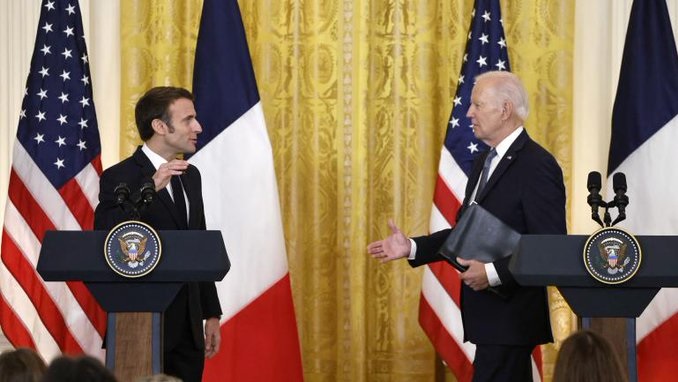
Today, the President of the United States and the President of the French Republic met in Washington during the first State Visit of the Biden-Harris Administration.
DECEMBER 01, 2022
Nuclear Deterrence, Nonproliferation, and Disarmament
The United States and France reaffirm that nuclear deterrence remains essential for their national security and a core component of NATO’s overall capabilities for deterrence and defense. They reaffirm that the fundamental purpose of NATO’s nuclear capability is to preserve peace, prevent coercion, and deter aggression against the Alliance. They reaffirm the importance of the Treaty on the Non-Proliferation of Nuclear Weapons and their opposition to the Treaty on the Prohibition of Nuclear Weapons, which does not reflect the increasingly challenging international security environment and is at odds with the existing non-proliferation and disarmament architecture. The United States and France also reaffirm support for their Mutual Defense Agreement and intend to expand their technical cooperation on a wide range of strategic risk reduction topics.
Economy, Emerging Technologies, Trade, and Supply Chains
The bilateral investment and trade relationship between our nations is longstanding and deep, creating significant jobs and prosperity for both. The United States and France reaffirm their commitment to an open and rules-based multilateral trading system, with a modernized WTO at its core. In that spirit, they continue to promote bilateral trade and investments that support supply chain resilience and our high-tech and innovative industries, including aerospace, information technology, pharmaceuticals, and finance. With a view to further enhancing their bilateral trade and investment relationship, they intend to hold discussions on reciprocal facilitation of visa issuance and renewal, and authorizations of stay.
The United States and France are committed to developing diverse and robust supply chains for critical minerals, including through their collaboration in the Mineral Security Partnership and the Partnership for Global Infrastructure and Investment. They reaffirm their shared goal of accelerating the global green energy transition. They look forward to the work of the U.S.-EU Taskforce on the Inflation Reduction Act to further strengthen the U.S.-EU partnership on clean energy and climate through mutually beneficial ways.
Space
The Presidents are committed to strengthening the U.S.-France alliance across all sectors of space cooperation. They highlight their engagement in continuing the longstanding bilateral cooperation in Earth observation for monitoring and assessing climate change and adapting to its consequences. In that spirit, they plan to working jointly on future Earth science missions. They welcome France’s commitment not to conduct destructive, direct-ascent anti-satellite missile testing and will work towards universal adherence to this pledge. The United States and France are determined to deepen collaboration on defense space activities, including military planning, information sharing, and operational coordination. They welcome the June 2022 signings of the Artemis Accords by France and of the Space for Climate Observatory Charter by the United States, as well as the first meeting of the U.S.-France Comprehensive Dialogue on Space in Paris in November 2022.
Energy
The Presidents welcome the successful first year of the U.S.-France Bilateral Clean Energy Partnership, which convened most recently in October 2022, as the high-level platform to advance our energy and climate cooperation. In reaffirming their joint determination to further synchronize and deepen cooperation on civil nuclear energy, the United States and France plan to set up a nuclear energy small group within the Partnership’s framework. The Partnership’s priorities also include deepening civilian nuclear cooperation and contributing to a reliable nuclear supply chain, in accordance with the highest standards of nuclear nonproliferation, including the application of IAEA Additional Protocol, and by further reducing reliance on civil nuclear and related goods from Russia. The Partnership will promote advanced nuclear power globally, which has a key role to play in order to reduce global CO2 emissions, while continuing efforts to limit the spread of sensitive enrichment and reprocessing technology.
The United States and France continue to promote energy policies, technology, and innovation that enhance renewable energy production and accelerated deployment. They intend to continue to support the diversification of Europe’s natural gas supply, including through U.S. liquified natural gas exports, as well as to cooperate in reducing overall demand for natural gas in alignment with climate objectives. The Presidents welcome the progress made through the U.S.-EU Task Force on Energy Security to diversify the EU’s natural gas supplies, reducing its cost and limiting its dependence on natural gas.
Sur le même thème
Joint Statement Following the Meeting Between President Biden and President Macron (2-4)
